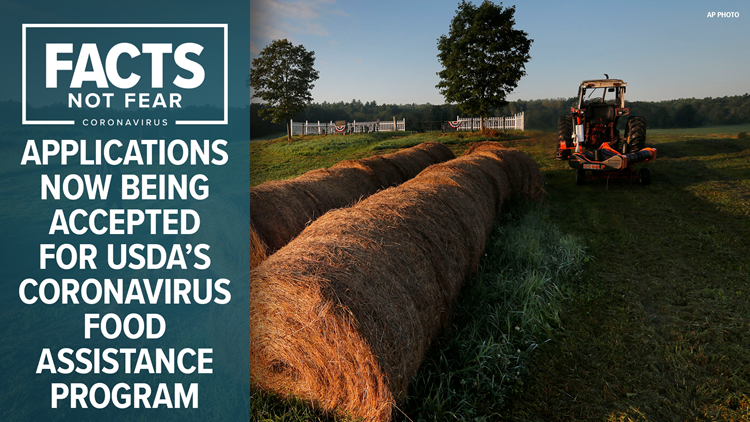WASHINGTON, D.C., USA — Applications are now being accepted for the U.S. Department of Agriculture's Coronavirus Food Assistance Program (CFAP), which will provide up to $16 billion in direct payments to help American farmers who have suffered losses due to the coronavirus pandemic.
Sen. Susan Collins and Rep. Chellie Pingree have been working on a bipartisan effort to offer more support to Maine farmers, who have unique situations compared to most farmers across the U.S. While both Collins and Pingree are urging Maine farmers to apply for the program—which was created through the Coronavirus Aid, Relief, and Economic Security (CARES) Act—they are continuing to urge the USDA to prioritize assistance to Maine farmers in future relief efforts.
Maine farmers are already missing out on the USDA's Farmers to Families Food Box Program, which is another USDA program made possible through the CARES Act, and Rep. Pingree says the way the CFAP program is designed won't be beneficial to Maine farmers.
“While all farms are struggling to stay afloat in this pandemic, small farms are particularly hard hit. Since the beginning of this crisis, I’ve urged congressional leadership and the Trump administration to prioritize direct aid to small farmers who haven’t had the benefit of receiving trade bailouts,” Pingree said in a statement. “I hope Maine’s small farms will begin applying for this direct aid as soon as possible, but acknowledge this funding is not nearly enough to address the unique situations or offset the losses facing our local growers. I am working to ensure that future COVID-19 aid packages are made accessible to farmers with later growing seasons like Maine’s and will address the diverse needs of all our small farms.”
Read Collins and Pingree's letter to the USDA:
CFAP applications are open to agricultural producers who have suffered a 5% or greater decline in business due to the pandemic.
Eligible commodities include:
- Non-specialty Crops: malting barley, canola, corn, upland cotton, millet, oats, soybeans, sorghum, sunflowers, durum wheat, and hard red spring wheat Wool
- Livestock: cattle, hogs, and sheep (lambs and yearlings only)
- Dairy
- Specialty Crops
- Fruits: apples, avocados, blueberries, cantaloupe, grapefruit, kiwifruit, lemons, oranges, papaya, peaches, pears, raspberries, strawberries, tangerines, tomatoes, watermelons
- Vegetables: artichokes, asparagus, broccoli, cabbage, carrots, cauliflower, celery, sweet corn, cucumbers, eggplant, garlic, iceberg lettuce, romaine lettuce, dry onions, green onions, peppers, potatoes, rhubarb, spinach, squash, sweet potatoes, taro
- Nuts: almonds, pecans, walnuts
- Other: beans, mushrooms
Victoria Bonney, the communications director for Pingree, explained to NEWS CENTER Maine that there are several reasons why Maine farmers will have a hard time getting relief from the CFAP program. One, being that many Maine farms are diversified, meaning they grow and sell more than one type of crop. Another, is they haven't yet reached the 'injury' period that's laid out in the program eligibility.
The USDA says, "Commodities that did not suffer a five percent-or-greater price decline from mid-January 2020 to mid-April 2020 are not eligible for CFAP."
While most farms across the U.S. have already suffered heavy losses due to the pandemic, Maine's crop season is happening now, so the losses haven't been fully revealed yet. So getting through the application itself is challenging for Maine farmers in particular.
Bonney said Pingree, who is an organic farmer and a member of both the House Agriculture Committee and the House Appropriations Subcommittee on Agriculture, is pushing to show the USDA there is room for improvement with their coronavirus relief programs, and that the process should be easier for farmers to access. Pingree hopes they can work to make adjustments going forward.
Collins' communications director Christopher Knight said Collins "stands ready to assist Maine’s small farmers, and she will continue to work with Rep. Pingree and her other colleagues in Congress to reduce any unnecessary barriers to this crucial financial relief."
Knight said Collins will be "closely monitoring" the implementation of the CFAP program.
The Maine Department of Agriculture Commissioner Amanda Beal has also called on the USDA to strengthen the program's initiative, specifically for the Farmers to Food Box Program that resulted in no Maine distributed being selected for the program. Beal urged the USDA to consider reopening the bidding process for the Food Box program in the fall.
Applications for the CFAP program are being accepted through August 28, 2020. For information about how to apply, click here.
--
At NEWS CENTER Maine, we’re focusing our news coverage on the facts and not the fear around the illness. To see our full coverage, visit our coronavirus section, here: /coronavirus
NEWS CENTER Maine Coronavirus Coverage



